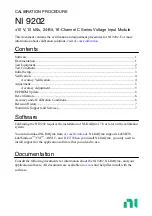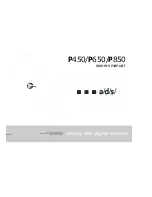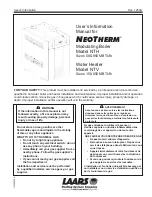
Page 21
UG_RGW_v1.12_EN
Q.
Do I need a plumber?
A.
Your grey water system requires connection to a potable water supply and the sewage system. A
licensed plumber will know the local plumbing codes and laws and therefore must do this work.
Q.
Can grey water from all parts of the house be reused?
Kitchen
:
A.
Kitchen wastewater could be heavily polluted with food particles, oils, fats, and other wastes. It
can also contain high concentrations of micro-organisms. It is often polluted with detergents and
cleaning agents, particularly those from dishwashers, which are very alkaline and may be harmful to
soils and plants by altering their characteristics in the long term.
For these reasons kitchen grey water is not recommended for use.
Bathroom
:
A.
Chemical constituents of bathroom grey water include soap, shampoo, hair dyes, toothpaste and
cleaning chemicals. Grey water from hand basins is more polluted than bath or shower grey water,
but is much lower in volume. Some of these contaminants act as plant nutrients and can be benefi-
cial in the garden, but others can adversely affect plants or soil structure.
Concern is often expressed about people urinating in showers and baths and the associated health
aspects of using grey water in the garden. However, urine in a healthy person is sterile. While some
bladder infections may pass micro-organisms in urine, the potential for these organisms to survive
and cause infection is considered remote.
Grey water from the bathroom is suitable for reuse.
Laundry
:
A.
Check local plumbing codes If the laundry option is allowed in your jurisdiction. Grey water from
the laundry improves in quality from wash water to first rinse water to second rinse water. Bacterial
loads in laundry grey water are not usually high, except when diapers are washed. Chemical con-
taminants of the wash cycle water are soap, salt, sediment and organic material. If used for garden
watering, the wash cycle water can damage plants and soils and create bad odors. Rinse water
contains a much lower pollutant load and the use of this water poses a much lower threat to the
environment and to the public health. Domestic pets, which are washed in the laundry tub, can be a
further source of contamination for grey water.
Grey water from the laundry, particularly rinse water is suitable for reuse.
Q.
Can I store grey water on my property before I use it?
A.
It is recommended that untreated grey water is not stored for more than 24 hours. When the im-
mediate reuse of grey water is not practical, for instance during periods of wet weather, grey water
should be directed to the sewer system.
Q.
What is a grey water treatment system?
A.
A treatment system will remove the bacterial load and chemical pollutants from grey water so that
it can be stored. However, satisfactory treatment tends to be neither simple nor cheap. Treatment
processes can include filtering, settling of solids, anaerobic or aerobic digestion, chemical removal
of pollutants, and disinfection.








































